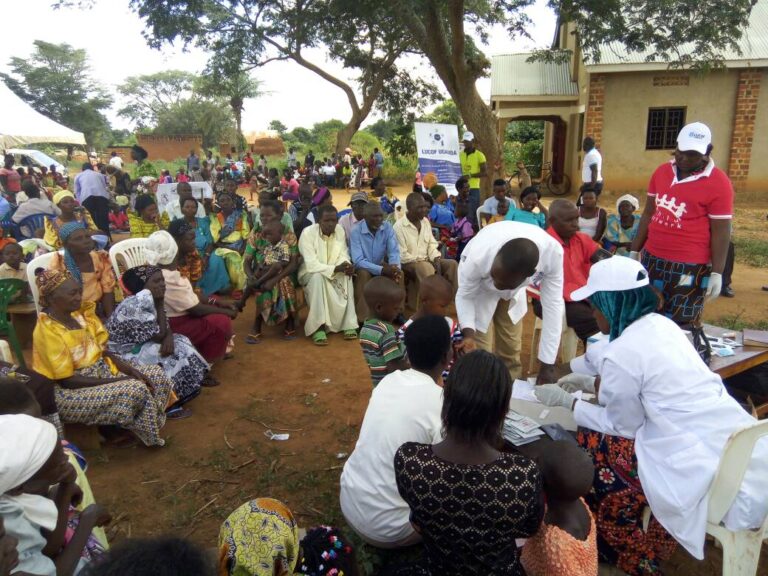
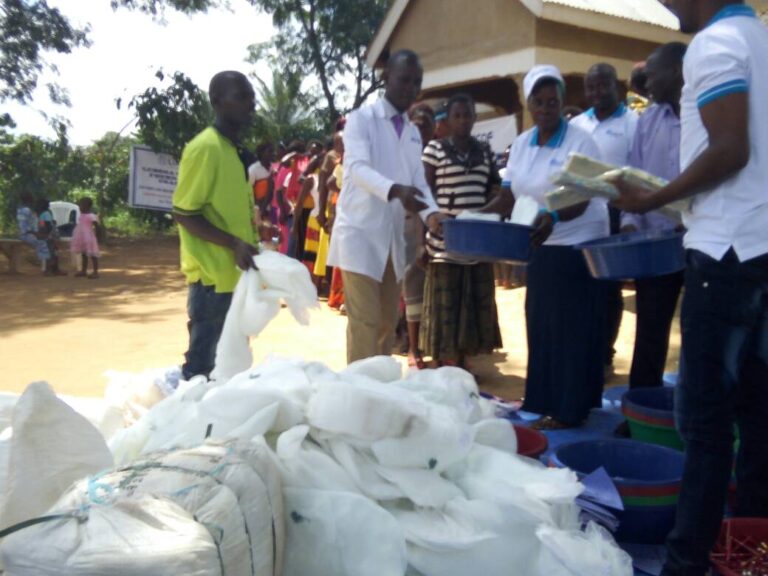
Malaria is endemic in Uganda; our areas of operation have not been spared either. An estimated 88% of the population is exposed to moderate to very high malaria transmission. It is a leading cause of child mortality, killing nearly 70,000 to 100,000 children each year. Malaria also carries significant adverse consequences for pregnant women, some related to nutrition. Malaria is the leading cause of morbidity and mortality in Uganda and is responsible for up to 40 percent of all outpatient visits, 25 percent of all hospital admissions and 14 percent of all hospital deaths.
Our work
We are mainly combating inefficiency in service provision by health providers and health facilities, as well as breaking the cycle of ignorance among the communities, as well as treatment.
The LUCOF child clubs LCC are being used as an instrument in fighting malaria i.e prevention, control and treatment. We carry out routine malaria testing for the children and households to prevent deaths as it has always been. We set up testing posts on important days of our calendar, as well as partnering with public and private health centres in testing for malaria
The LUCOF village health teams LVHTs are working hard to reach very household to ensure that all children prone to malaria, and those that are victims are worked on effectively. Individual, group and class sensitisation and teaching of children in homes, and schools on how to prevent malaria infections, and react to sign and symptoms in order to get immediate treatment. Our team and volunteers make outreaches to households and communities in sensitisation about prevention and treatment
Mosquito nets: We work hard in supplying free insecticide treated mosquito nets in what we call two people per net initiative. We also engage in indoor residual spraying to kill mosquito breeding grounds and destroy mature anopheles
Basic health norms: We encourage children and households to have good hygiene, sanitation and drink clean boiled water to reduce accelerators and stimulators of malaria infections. Our team and volunteers ensure that bushes around homes are slashed, dangerous ponds, old water containers are all destroyed in order to destroy breeding grounds for mosquitoes, and asking households to close windows early enough
We facilitate the treatment of children, pregnant women and the aged at public and private health centres, by providing transport and financial fees to ensure effective treatment. We have created strong partnerships between LVHT and doctors with public and private health institutions. Our mobile doctors also carry our treatment and distribution of anti-malaria drugs.
Sensitisation in schools Our teams use all available opportunities to sensitise children and community households in schools, at our important days, in village meetings, workshops and other public gatherings. Our partnerships with the local community and local leaders has produced fruitful results in our fight against malaria
We also initiated the LUCOF Aloe vera initiative, LAVI, by ensuring that most of the households have aloe vera plants that help treat malaria in our communities
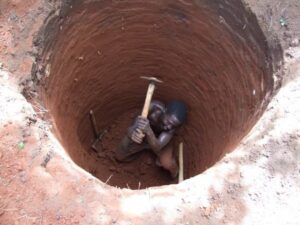
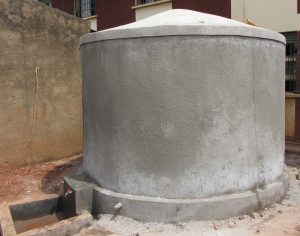

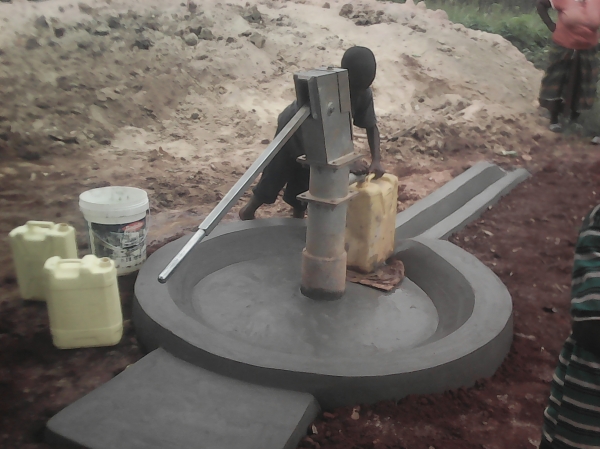
Over half the population in Uganda lacks a latrine. 8.5 million people in Uganda don’t have access to safe water. This is almost a quarter of the population. Over 26 million people don’t have access to adequate sanitation in Uganda, almost two thirds of the population. Over 15,000 children die every year from diarrhea caused by unsafe water and poor sanitation in Uganda. Diarrhea is the third biggest killer of children under five years old in Uganda. (Child Health Epidemiology Reference Group (CHERG) 2012)
What LUCOF is doing
Latrines: We are carrying our general household and community sensitisation about proper hygiene and sanitation, so that they can live in proper health. LUCOF is also ensuring that our local community schools have proper sanitation, by helping build pit latrines. This is also being done and being encouraged in homes. We are also helping provide tissue paper to use for proper sanitation after using the latrines in schools and homes
Washing: Our different departments are joining hands in providing sanitation soap, for hand washing, body bathing and laundry washing, to ensure good health. We are being innovative in introducing cheap after latrine bathing tippy taps in schools and homes to ensure that students and households reduce the risk of infections after using the latrine
Health centres: We ensure that we provide public health centres with logistics to help the community, such as soap, gloves, jerrycans to help the large numbers. We work with service providers and our volunteers to spray latrines in schools and homes so that cleanliness is ensured, the millions of germs causing diseases are reduced
Basic health care: We have taught the households in setting up drying racks, such that food utensils are washed, and dry well for a better hygiene. We have introduced a dust bin and pit latrine initiative in schools and homes, and sensitising the populace on how to separate decomposable from non-decomposable materials. Our initiative to provide bathing basins and water jerrycan in homes has also been fruitful. The construction of sewerage pits to help facilitate the drainage of shower and latrine water is also at the forefront of our projects. This has helped partly solve sanitation and hygiene problems
Water: We have helped reclaim and rehabilitate natural water wells, by mobilising the community volunteers to help clear the wells, such that clean water is accessed by the households. We help provide carriers for poor families, such as bicycles and wheelbarrows, to help them carry water from far way water distances. We have helped some schools secure water tanks, and also assisted them in harvesting water in barrels. This is the same case with poor households. We have assisted tens of households in securing tap or piped water, especially in semi urban households, such that water problems are solved. Shallow wells are a part of our projects, as we seek to assist schools and community households to get these, such that water problems are solved consequently. Rehabilitation of boreholes is at the forefront of our projects. However, we seek to start setting up boreholes and waterholes/pumps in schools and communities, such that water problems are solved
We are fighting abject poverty in our communities, since tangiasis is known as a disease of the poor
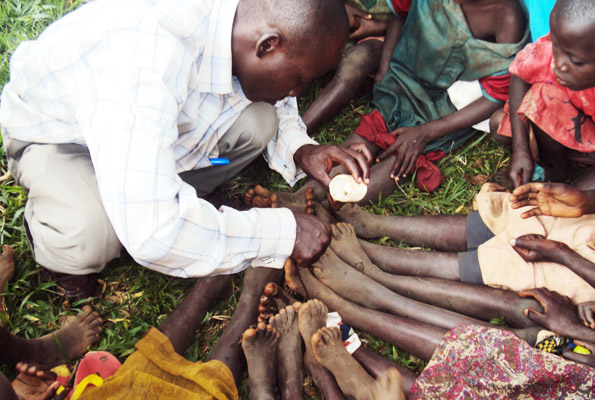
Immunisation: We are sensitising ignorant parents to take their children for immunisation against diseases such as polio, tuberculosis, measles, tetanus, among others, help motivate parents with logistics, in enticing them to participate in immunisation processes, we provide transport to parents and their children to transport them to immunisation points, and we help in publicity and advertisement of immunisation process, and help public health centres in information dissemination on immunisation processes
Neonatal health: We increase the demand for, and access to lifesaving neonatal health interventions. We promote access to, and use of, this low-cost antiseptic for umbilical cord care. We provide information about breastfeeding and we offer prenatal vitamins.
Pneumonia: We focus on integrated case management and pre-packaged treatment to ensure access to appropriate and affordable care.
Diarrheal Disease: Our programs focus on prevention through water and sanitation interventions, nutritional interventions, and diagnosis and treatment.
Malaria: At the forefront of community malaria control efforts, we carry out sensitisation, logistic support and treatment.

Uganda Registration: S.5914/11502
Nederland Registratie: Kvk-nummer 83487166
BTW-Identificatienummer: NL862892983BO1